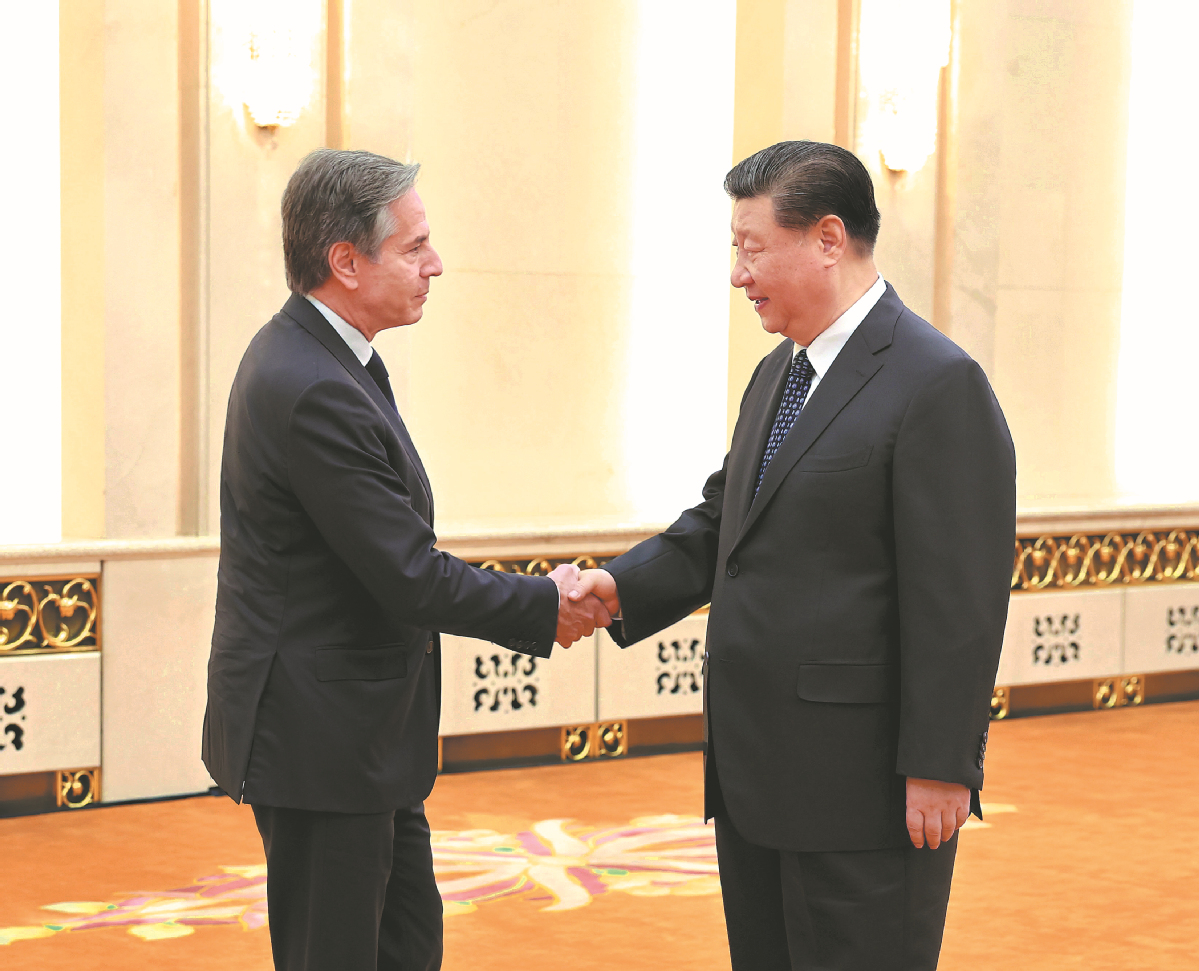Mutual progress key for relationship
Meeting Blinken, president warns against pursuing zero-sum game


President Xi Jinping has urged the United States to look at China's development positively and refrain from creating small blocs to instigate confrontation.
Xi made the remarks during a meeting with US Secretary of State Antony Blinken at the Great Hall of the People in Beijing on Friday.
The meeting, on the final day of Blinken's second visit to China in the past year, came as communications between the two countries have expanded in recent months.
Blinken's visit, which started on Wednesday, also took place as a result of the consensus between Xi and US President Joe Biden during a telephone conversation on April 2. The visit also took him to Shanghai.
At his meeting with Blinken, Xi said that the planet is big enough to accommodate the common development and respective prosperity of China and the US.
"China is happy to see a confident, open, prosperous and thriving United States. We hope the US can also look at China's development in a positive light," he said.
"This is a fundamental issue that must be addressed, just like the first button of a shirt that must be put right, in order for the China-US relationship to truly stabilize, improve and move forward."
During his meeting with Biden in San Francisco in November, Xi proposed what he described as "five pillars" for China-US relations: establishing correct perceptions, effectively managing differences, promoting mutually beneficial cooperation, shouldering major-country responsibilities, and advancing people-to-people exchanges.
China is willing to cooperate with the US, but such cooperation should be two-way, Xi told Blinken.
"We are not afraid of competition, but competition should lead to mutual progress rather than a zerosum game. China is committed to non-alliance, and the United States should also avoid creating small blocs. Both sides can have their own friends and partners without targeting, opposing or harming each other."
The president emphasized that it is the shared aspiration of the two peoples and the international community to see China and the US strengthen dialogue, manage differences and advance cooperation.
"China and the United States should be partners rather than rivals; help each other succeed rather than hurt each other; seek common ground and reserve differences, rather than engage in vicious competition; and honor words with actions, rather than say one thing but do the opposite," he added.
Blinken said that during his visit, he had encountered US nationals from various sectors in China who hope to see an improvement in US-China relations.
The US does not seek a new Cold War, does not seek to change China's system, does not seek to suppress China's development, does not seek to revitalize its alliances against China, and has no intention of having a conflict with China, he said.
While pledging that the US adheres to the one-China policy, Blinken said that the US wants to maintain communication with China, earnestly implement the common understanding reached by the leaders of the two countries in San Francisco, pursue more cooperation, avoid misunderstandings and miscalculations, and responsibly manage differences in order to achieve the stable development of US-China relations.
Before the meeting, Foreign Minister Wang Yi held talks with Blinken.
Wang said that the Taiwan question is the first red line that must not be crossed in China-US relations. He urged the US to refrain from using Taiwan as a tool to contain China, stop arming Taiwan and support China's peaceful reunification.
Noting that the US has taken endless measures to suppress China's economy, trade and technology, Wang said Washington should stop hyping up the false narrative of "overcapacity" in China, lift sanctions on Chinese companies and stop adding section 301 tariffs that violate the rules of the World Trade Organization.
Noting that the Asia-Pacific region should not become an arena for major powers, Wang expressed the hope that the US will make the right choice, meet China halfway and achieve positive interactions in the Asia-Pacific.
Both sides agreed to continue efforts to stabilize and develop China-US relations in accordance with the common understanding reached by the two countries' leaders and maintain high-level exchanges and contacts at all levels, according to a statement released by the Foreign Ministry following their talks.
Both sides announced the holding of the first government-to-government dialogue on artificial intelligence, as well as a new round of consultations on Asia-Pacific affairs and maritime affairs. The US welcomes Liu Zhenmin, China's special envoy for climate change, to visit the US, the statement said.
Both sides will take measures to expand cultural and people-to-people exchanges, welcoming students from each other's countries and ensuring the success of the 14th China-US Tourism Leadership Summit, which will be held in Xi'an, Shaanxi province, in May, it said.
Both sides will also maintain consultations on international and regional hotspot issues, and the special envoys of both sides will strengthen communication, it added.
caodesheng@chinadaily.com.cn




































